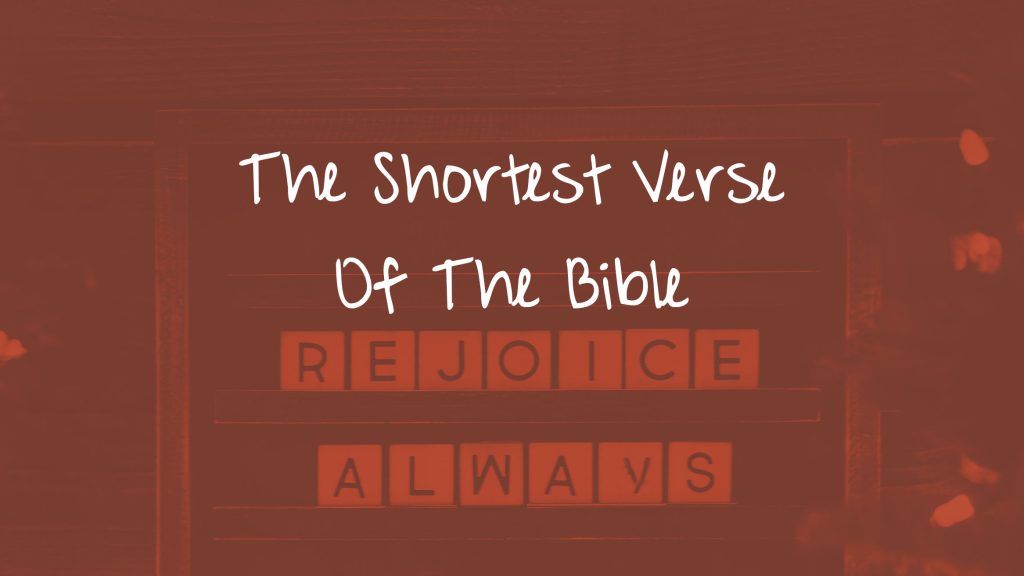|
Getting your Trinity Audio player ready...
|
Rejoice always (1 Thessalonians 5:16, ESV).
“Rejoice always” in 1 Thessalonians is the shortest verse in the Bible.
For those who are more scholastic, you may disagree and say that John 11:35 is the shortest verse. This verse reads, “Jesus wept.”
Being the responsible semi-scholastic author of Interruptions, I went to the Greek and found that John 11:35 has 16 Greek letters, while 1 Thessalonians 5:16 has 14 Greek letters.
Goal for 1 Thessalonians 5:16!
Now some of you — very erudite and snobby intellectual types — are now huffing and puffing that Luke 20:30, which translates as “The second,” in the New International Version, is the shortest with only 12 Greek letters.
However, there is a dispute about Luke 20:30, as many Greek manuscripts have a longer version of Luke 20:30, reading, “So the second brother married the widow, but he also died.”
So, let’s count out Luke 20:30 as the shortest verse on a technicality.
We could also consider Job 3:2 as the shortest, which is translated as “He said.” Yes, it has only 6 letters in the Hebrew. But reading Hebrew manuscripts is not for the faint of heart as some manuscripts have consonants with no vowels.
Yep, a verse in a Hebrew manuscript has consonants but no vowels.
HHHHMMMHHM . . .
Can you imagine the scowling looks we would have received from our first-grade teachers — as some of us still have difficulty reading English, with both consonants and vowels?
Not counting vowels, Job 3:2 has 6 Hebrew letters. But some manuscripts have vowels. These ancient scribes, having purchased vowels from Vanna White, have 18 letters in their Hebrew manuscripts.
Again, let’s count out Job 3:2 on a technicality (6 consonants and 12 vowels = 18 letters), despite protests from both Pat Sajak and Vanna White of Wheel of Fortune fame.
I’m glad that 1 Thessalonians 5:16 is the shortest verse of the Bible. And that it has both consonants and vowels. Let’s read it again . . .
Rejoice always!
What a message — to be joyful always.
Paul echoes this teaching again when he literally doubles down on the rejoicing message in Philippians . . .
Rejoice in the Lord always; again I will say, rejoice (Philippians 4:4, ESV).
Rejoice always, again, rejoice always. How do we rejoice always?
Rejoicing is supernatural. We won’t attain total rejoicing without a filling of God’s Spirit.
Let’s put 1 Thessalonians 5:16 in context . . .
Rejoice always, 17 pray without ceasing, 18 give thanks in all circumstances; for this is the will of God in Christ Jesus for you. 19 Do not quench the Spirit (1 Thessalonians 5:16-18, ESV).
First: Rejoice always. Second: Pray without ceasing. Third: Give thanks in all circumstances, and Fourth: Do not quench the Spirit.
Not only does Paul tell us to rejoice always, but also pray always and give thanks always.
Can’t be done without the Spirit of God! Let’s pray this prayer, “God, fill us with your Spirit today.”
Author’s Note: The longest word used in Interruptions is HHHHMMMHHM. Yes, consonants and no vowels. And yet, we get the meaning. Same with Hebrew readers, as they understand words without vowels.

